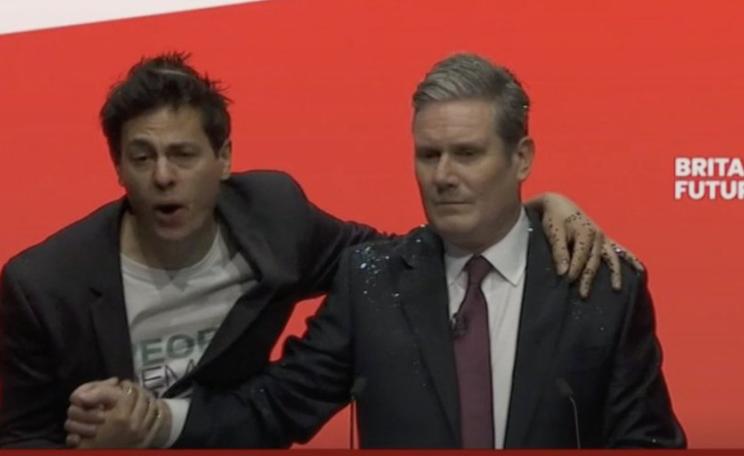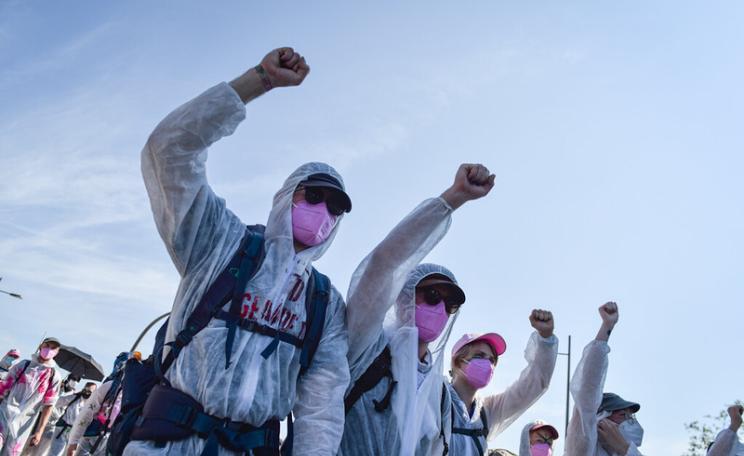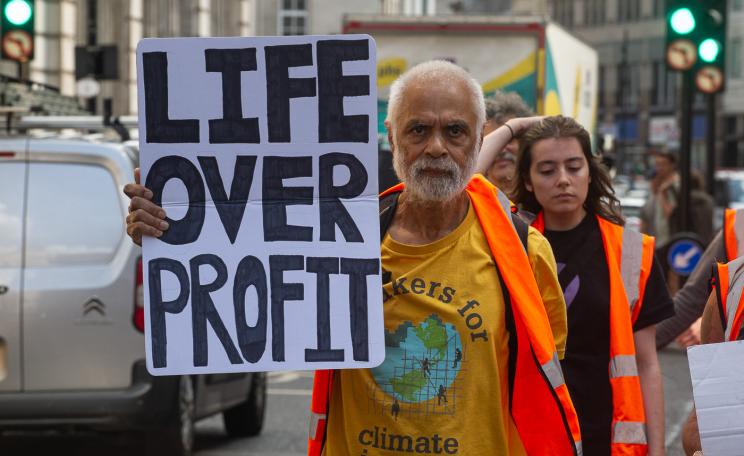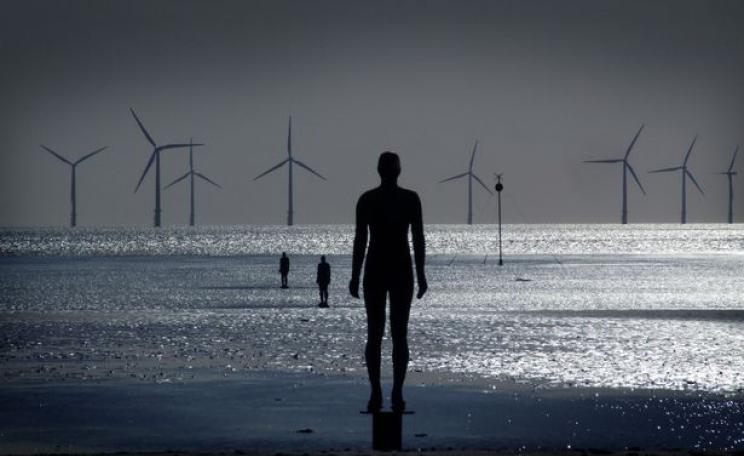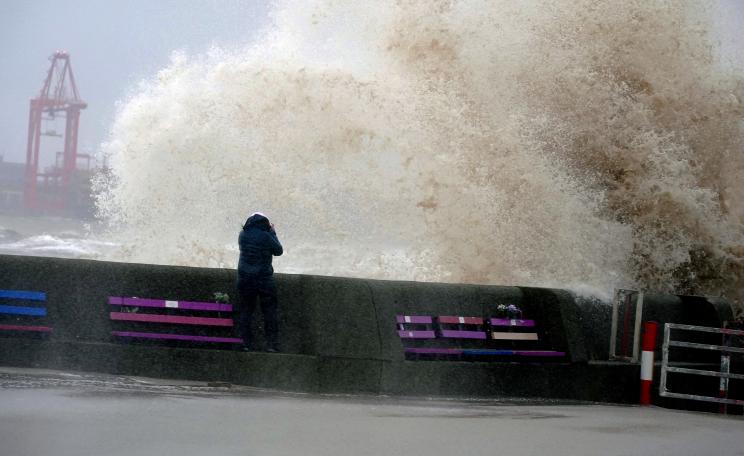The most cutting edge, agile and beautiful modalities to combat mental ill health and climate change all reject the individualistic framing.
Climate breakdown, and all the mental despair and trauma it visits upon us, is impossible to confront in its entirety. Even in the abstract, it’s something that will always elude us.
If you are experiencing mental health distress you can reach out to the Samaritans or find out more information from the charity Mind.
Climate breakdown is pervasive, mysterious and refracting: incomprehensible to any single being. But we don’t need to fully understand something, cognitively, for it to affect the way we think, feel and experience the world. Climate change has undeniable and severe impacts on the mind.
Charlie Hertzog Young will be speaking at the SMALL IS THE FUTURE event taking place on Saturday, 17 June 2023. Speakers include Dr Ann Pettifor, Gareth Dale and Yasmin Dahnoun. A few remaining tickets at £3 for the online event are still available.
In the Global North we’re used to thinking of the mind in a reductive, inaccurate way. Even after a decade of different talking therapies, hospitalisations and suicide attempts, I still defaulted to ideas about ‘chemical imbalances’, ‘brain glitch’ and the need to find some way of just ‘returning to normal’.
Neurochemistry
That involved medication - which I should note I still take, and find helpful - psychoanalysis, psychiatric units, extended isolation and electro-convulsive therapy.
By and large my issues were talked about and treated as an internal aberration. I’ve been a climate activist since I was a child.
It took me jumping off a six-storey building at 28 and losing both my legs to kick-start a deeper investigation of how the climate, not just erratic neurotransmitters, could be influencing my psyche. It’s been mind-blowing.
Western psychiatry leans heavily on what’s referred to as a bio-medical model of the mind, an individualistic approach that treats the brain like a computer.
If there’s a deviation from the accepted norm, it’s the role of the psychiatrist to rebalance the patient’s neurochemistry, a problem situated within the skull whose solution lies in an individualised input that will fix the broken brain.
Minimising
This can be very effective for some. But it’s deeply inappropriate for many. It’s replete with power imbalances, erasures of lived expertise and dangerously devoid of any reckoning with the outside world.
When we’re repeatedly told by medics, practitioners, commercialism and more that it’s not only our bodies at fault but our job to fix too, it becomes very difficult for those of us with mental health issues to avoid blaming ourselves, hating ourselves and damaging ourselves.
The most cutting edge, agile and beautiful modalities to combat mental ill health and climate change all reject the individualistic framing.
The statistics bear this out. It’s no surprise so many of us struggle to reintegrate into the world. Climate breakdown, disturbingly, is often dealt with in a similarly individualised way.
That might be voting. Choosing careers. Deciding whether or not to show up at a protest. Whether to have children. A major factor here is own personal carbon footprints.
For those concerned about the planet, there’s a bind of either individually minimising our emissions, or else suffering debilitating feelings of guilt and powerlessness.
Emissions
But we should never forget that it was BP that first developed the concept of the individual carbon footprint – a remarkably effective effort to shift responsibility away from large, powerful emitters and onto all of us.
It makes me deeply sad that people are made to carry so much of the mental and logistical burden of this catastrophe, in stark contrast to how responsible we actually are.
I am one of around 7.8 billion people on the planet now. Over my lifetime we’ve emitted around 50 per cent of the carbon released into the atmosphere since the Industrial Revolution.
If we were to take an average - and I know that’s inaccurate, but stay with me - then I would be personally responsible for 0.0000000064491165 per cent of all historical emissions.
To express that in a format we can relate to, if we converted all historical emissions into the distance between the earth and the moon – approximately 350,000 kilometres – the average person’s emissions over the last twenty-five years would get us 2.5 centimetres of the way there.

Physical
That’s about half the height you’d gain by standing on your tiptoes (I can’t, no legs, so you can do it for me).
Any climate guilt at all, I would argue, is inappropriate and maladaptive. Almost irrelevant. It hurts the sufferer, and by extension limits their capacity to enrich other people’s lives.
Over half of young people globally report troubling feelings of guilt. It is astonishing that fossil-fuel companies have so deftly shifted the blame onto individual consumers.
Climate guilt, alongside our powerlessness, is reportedly one of the most common drivers of climate-related mental health issues, at least in the Global North.
Guilt, we’ve found out recently, can have a powerful causal link to serious mental health issues. In a series of shocking studies, researchers found that excessive guilt in children can have a pronounced physical impact on the development of the brain.
Therapies
The term bio-psycho-social is being more readily applied by mental health practitioners in recent years, a recognition of the importance of material and interpersonal context, including economics and ideology, on the mind - even if the emphasis lands very heavily on the ‘bio’ portion.
Researchers, indigenous communities, scholars, mental health activists and some deft policymakers incorporate an -eco suffix, a vital portion that’s very often left out, even by those on the left.
Way back in 1989 Felix Guattari, for instance, wrote The Three Ecologies. In it he proposed a new psychoanalytic model based on three distinct ecological realms.
The first was the human mind, itself a dense and messy web of an ecosystem. The second was the social realm, which included the political and the cultural, the mechanisms of power through which we live our lives. The third was the global environment, the physical reality we align ourselves with and fit ourselves into.
Contemporary science and practice is playing this out, including the WHO’s One Health initiative, Whole Person approaches to mental health, peer-to-peer support groups, community organising as a model for collective recovery, trauma therapies, recovery coaching, generative and politicised somatics, and, of course, the litany of cutting edge research on climate-related mental health issues.
Complex
One study carried out multiple assessments of children over the course of ten years and found that pathological guilt reduced the size of the anterior insula area of the brain, while another found cortical thinning in the brains of pre-schoolers with maladaptive guilt.
These, in turn, are strong predictors of depression. Even toddlers under three years old who displayed symptoms of pathological guilt were found to be ten times more likely to develop major depressive disorder by the age of five.
In the cases of mental ill-health and the climate crisis, we’ve managed to get stuck back into the atomised, individualised boxes that got us here in the first place.
We’re disempowered, disconnected and disillusioned. But there’s a vast array of different ways to understand our situation, and act despite the systemic context we’re forced to live in, in ways that open our world up and reconnect us to support, care and radical imagination.
The mind isn’t some black box. Our consciousnesses are just as complex and incomprehensible as the climate.
Strategies
These range from anxiety, depression, psychosis, PTSD (even Pre-TSD) and suicide linked to relating to climate change in the abstract, to the manifold experiences of those psychologically pushed over the edge by heatwaves, climate-induced conflict, flooding, crop-failure, migration and more.
The biggest climate mental health burden is in the Global South, even though what we’ve heard most about so far is eco-anxiety in the Global North - vital as the latter is to understand.
One Pakistani mental health professional I spoke to following last year’s cataclysmic flooding in her country talked to me about the psychic toll.
Despite the massive, existential distress, mental health is barely an afterthought in terms of international aid, other than offensively simplistic guidelines to simply deliver antidepressants to 20 per cent of those displaced.
Instead, for her, there’s a need to focus on building relationships and working on strategies, together, to find how best to cope in a new world.
Modalities
Practitioners are training communities in mental health first aid, communities are teaching practitioners different cosmologies of mental health, together, in strategically nested groups, they’re learning new ways to look after each other in an unpredictable and terrifying new reality.
These strategies exist in small pockets, all over the world. They’re undersupported, largely run unpaid, largely unconnected, but they’re finding one another.
These communities of care allow people to educate and support one another, and we need them anywhere and everywhere that climate impacts might hit.
Over and over again, it turns out that the best placed communities to deal with climate devastation – especially from a mental health standpoint – are those with pre-existing webs of mutual aid and community cohesion, from New Zealand to the US, Mainland Europe to Singapore, Mexico to Nigeria.
In my experience and those I’ve spoken to, the most cutting edge, agile and beautiful modalities to combat mental ill health and climate change all reject the individualistic framing.
Powerless
They involve some kind of collaboration, planning and context-appropriate improvisation. They involve a restructuring of our lives that acknowledges our needs and those of the world in a different way.
They involve creating spaces of personal and collective sanctuary, as well as pragmatic responses that address what is at the root - ‘root,’ tellingly, is the etymological derivation of the word ‘radical’.
If climate change, understandably, is messing with people’s heads, then we need climate action to be part of our recovery – for our own sakes, as well as that of the planet.
Individualised climate action can be just as ineffective and inappropriate as airdropping pharmaceuticals into devastated communities. Reducing our personal carbon footprints can be a great thing.
With that in mind, I worry that individualising our responses is very convenient for those in power. Guilt can cripple. We can feel even more powerless. Calling each other out for not being green enough sows division, fear and secrecy.
Unravelling
Spending huge amounts of money and time on being greener can be exhausting. It can also, structurally, be unstrategic, relying on market forces that take larger signals from those with more cash.
It’s very often exclusionary, too, especially to those who aren’t culturally tied to the movement or lack the knowledge, income or energy.
What we often miss when we focus on inward facing action, as important as it is to live a life in line with our values, is the huge untapped benefit of experiencing connected climate action as a mode of personal and planetary recovery.
One of the reasons I found newfound knowledge of the immensity of climate change so destabilising, back in the mid-noughties, was that it opened a window onto huge systems of oppression I’d been unaware of up to that point. It was paralysing.
But unravelling the unavoidable realisation that deep systemic change was needed, and desirable, was ultimately a route to huge beauty for me.
Eco-co-operatives
Recently, through meeting and working on issues I care about with extraordinary people I’ve experienced the emancipatory potential of working through trauma and coming out, changed, rather than cramming myself back into the system that made me sick in the first place.
Vitally, we put relationships above specific goals and refuse to rush. This is disarmingly subversive.
We’re often taught to think a better life is the end result of an otherwise thankless struggle, that it takes self-sacrifice and puritanical dutifulness. We’re also taught its inherently a lonely task, a combative aggressive one, and only accessible to a privileged few.
But if each of us are supported enough, there are paths to personal and planetary healing through pleasure, joy and connection. For some of those I collaborate with, like The Eco-anxiety in Africa Project’s Jennifer Uchendu, partying is a vital movement strategy and act of collective meaning-making.
For others, like Green Squad’s Fahad Rizwan it’s building eco-co-operatives, tree planting and intercultural celebrations in conflict areas.
Critical
In the UK it might look more like helping run a Living With The Climate Crisis workshop series in our communities, letting down the tyres of SUVs with friends, organising a neighbourhood training to insulate each other’s homes (possibly through a mutual aid network), taking over a council and piloting a green basic income, rewilding (or guerrilla gardening), mass trespass of countryside or urban space, campaigning for a four day week in our workplaces (surprisingly climate-friendly), supporting progressive Green New Deal pushes, especially recognition and economic support for low-carbon relationship-based jobs like care work, joining a climate-aware psychological support group (like with the Climate Psychology Alliance) or an online community (like GenDread), or getting involved with groups like Force of Nature, Tipping Point, Healing Justice London, Civic Square and All We Can Save.
Organising has to be pragmatic. It has to address real needs. A collaborative approach to solving immediate problems provides an oasis of communality, nestled within the neoliberal desert.
We have seen an immense amount of this spring up in the UK in recent years, in the form of resisting deportations, renters’ unions, community safety, abolitionism, strike action, sharing food and shelter and more.
When people support each other, become empowered and have the opportunity to expand their critical thinking and action, a qualitative shift occurs. It is a refuge, but also a promise of much more: a different way of living.
Connection
Climate breakdown has already thrown us into an era of unprecedented precariousness. The mental health epidemic has been warping our minds for decades.
Now the two are feeding off each other. We have no solid blueprint for this. In many ways that is a positive thing.
What we do have is a vast collection of ideas, movements and actions that could help us shift course and, as we do so, contribute to building a series of alternative systems that can realign human society with ecology and make us healthier in the process.
Relationship-building and collective effort will help us form new elements of our identities, more densely woven communities, along with enriching, exciting and unexpected experiences.
These will act as dependable mental flood barriers against the rising tide. They will only become more useful, even necessary, as the state of the crisis intensifies, threatening to tear apart whatever bonds we already have. Disconnection and domination got us here. Connection and equity will set us free.
This Author
Charlie Hertzog Young is the author of Spinning Out: Climate Change, Mental Health and Fighting for a Better Future which can be pre-ordered soon. A proudly mad bipolar double amputee, he has worked for the New Economics Foundation, the Royal Society of Arts, the Good Law Project, the Four Day Week Campaign and the Centre for Progressive Change. He tweets at @utopianrealism.
If you are experiencing mental health distress you can reach out to the Samaritans or find out more information from the charity Mind.



